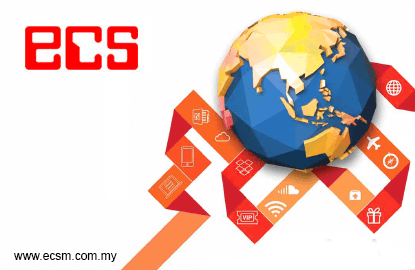
This article first appeared in Corporate, The Edge Malaysia Weekly, on July 11 - 17, 2016.
DO you think virtual reality (VR) devices will be the next wave of technology? For ECS ICT, the answer is yes, and it has jumped on the VR bandwagon.
In May, the company announced plans to bring in Orion VR goggles and introduce some new models by two major brands in the second half of the year.
“Orion is only our first attempt. We want to let the world know that we are in the VR market. In fact, we are already talking to a few market leaders,” says CEO Soong Jan Hsung.
While he declined to reveal the names, it is widely known that the top brands in the VR market are Facebook’s Oculus, HTC, Samsung, Sony and Microsoft.
VR, also known as immersive multimedia or computer-simulated reality, is a computer technology that replicates an environment — real or imagined — and simulates the user’s physical presence to allow for his interaction.
VR goggles present an artificial, but seemingly real, 360° view and 3D world through a headset that can track a person’s head movements to ensure a full immersion sensation.
Soong says the goggles are now being used for entertainment and educational purposes as users can experience being inside a movie or a music video, at a live concert or even on a trip.
Moving forward, the potential of VR will likely evolve to encompass commercial uses as well, as industries, such as real estate, fashion and automotive, will be using it as a marketing tool.
For instance, real estate agents can show potential buyers the layout of a house virtually, allowing them to walk through the various rooms. Similarly, car salesmen can provide potential customers with a virtual experience of driving their desired vehicle before making a purchase.
International Data Corporation (IDC) forecasted in April that the worldwide shipments of VR hardware will skyrocket this year with the total volume reaching 9.6 million units, compared with 400,000 units last year.
The research outfit also predicts that by 2020, the volume will rise to 64.8 million units, increasing at a compounded annual growth rate of 183.8%.
“One thing is for sure: very soon, every household will have at least a pair of VR goggles because they are so affordable,” Soong says, adding that ECS ICT’s first batch of 2,000 pairs of Orion VR goggles have all been sold within a month. He is now waiting for the second batch to arrive.
He says the company is targeting to sell 3,000 to 5,000 pairs of VR goggles per month. “We are going to sell a lot because our smartphone vendors want to bundle their products with the goggles. So, they are going to buy thousands of pairs from us.”
While Soong is excited about the great potential of VR devices, he is bothered by the fact that ECS ICT is seldom perceived as a consumer-related company by the investing public.
“Being perceived as a tech company is bad because most of the technology stocks are not doing well in Malaysia,” Soong tells The Edge in an interview.
Soong may have a point, considering that ECS ICT is involved in distributing smartphones, smartwatches and wearables. Its target market is the man in the street.
Incorporated in 1985, ECS ICT has evolved from a personal computer dealer into an ICT distributor over the years. It recorded a revenue of RM2 million in its first year of operation, but by its financial year ended Dec 31, 2015 (FY2015), this had leapt to RM1.9 billion.
The company distributes notebooks, smartphones, tablets, drones, printers, software and servers from more than 30 leading principals, including HP, Lenovo, Asus, Dell, Oracle, Microsoft, Cisco, Apple, IBM and VMware. It has a nationwide network of more than 5,500 resellers, comprising retailers, system integrators and corporate dealers.
As ECS ICT is currently classified under the technology sector, Soong acknowledges that most of the locally listed technology stocks are generally trading at a lower price-earnings ratio (PER) than consumer stocks.
A quick check on Bloomberg data shows that the Bursa Malaysia Technology Index is trading at a PER of 17.9 times, lower than the Consumer Product Index’s 21.2 times.
ECS ICT is currently trading at a trailing 12-month PER of slightly below 10 times. At last Tuesday’s closing price of RM1.53, its market capitalisation stood at RM270 million.
Its net profit hit an all-time high of RM32.5 million in FY2015.
In comparison, DKSH Holdings (M) Bhd, a renowned distributor of many top consumer brands, is being valued at 16.6 times or RM596 million, more than double that of ECS ICT.
However, it is worth noting that DKSH posted a net profit of RM36.8 million last year, only 13% higher than ECS ICT’s RM32.5 million. Furthermore, DKSH’s bottom line has been declining over the last three years, but ECS ICT’s earnings have been relatively stable.
Soong says ECS ICT is aiming for single-digit revenue growth and better earnings in FY2016.
Save by subscribing to us for your print and/or digital copy.
P/S: The Edge is also available on Apple's AppStore and Androids' Google Play.